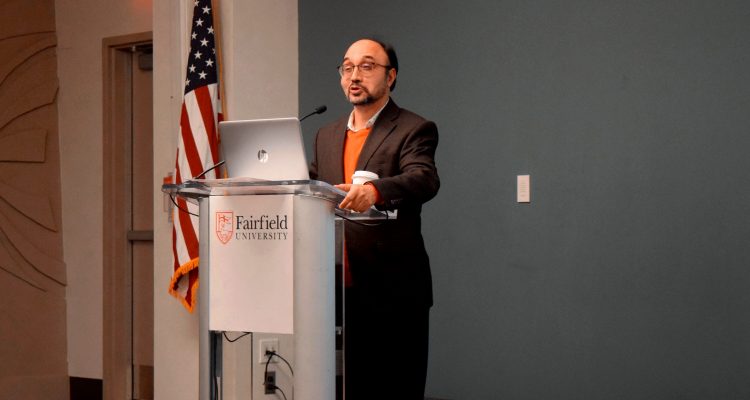The Fairfield community welcomed professor and scholar-at-risk, Sayed Hassan Akhlaq, Ph. D. last week on Feb. 24, for a series of classroom visits, guest lectures and a presentation of his research. During Dr. Akhlaq’s visit to Fairfield, I was fortunate enough to meet him and attend his lecture titled “Afghanistan: Looking Back, Looking Forward – My Journey to Freedom.”
In his lecture, Dr. Akhlaq shared his fascinating and inspiring life story: his refugee experience, his strategies for teaching critical thought and promoting academic freedom in Afghanistan and his forced exile due to his philosophical and political ideas and teachings.
He began with descriptions of his childhood and education. Born in Bamyan, Afghanistan, Dr. Akhaq was forced to emigrate to Iran with his father at the age of four after the Soviet Union invaded Afghanistan in 1979. His father was a scholar and a religious leader, with over twenty-five published books on Islam. Because of this, Dr. Akhlaq had always been interested in going to school and receiving an education. He explained that after high school, he attended university in which he joined an intellectual debate club. During a time in which many Afghans were left vulnerable and education was difficult to receive, Dr. Akhlaq was committed to promoting academic freedom and women’s rights. As he proved in his lecture, his commitment did not end with his college career.
It is through his professional and public contributions to educational reform in Afghanistan that he has become an acknowledged and praised individual.
Throughout the course of his lecture, Dr. Akhlaq spoke of many of his initiatives to promote academic freedom, one of them being the founding of Gharjistan University in Afghanistan. He claims that the goal in founding this professor-invested university was to support those in vulnerable or low-income situations and create an environment in which people felt at home, supported and as if they could follow their dreams. Dr. Akhlaq also conducted many public speeches at various universities as he claimed he did not want the ideals of academic freedom, human rights and women’s rights to be “strangers” to students. He aimed to familiarize people with these modern ideals and bring about hope for change in his speeches.
There were many strategies that Dr. Akhlaq employed to bring about this hope and change he spoke of. A big one was the “reconstruction vs deconstruction strategy.” Dr. Aklhaq claims that as a preface to his public speeches at universities, he would clarify that he was not there to destroy traditional values but to build something new. He explained in his lecture that he did not intend to build a political wall in promoting academic freedom or women’s rights. Instead, he intended to build a meaningful education for the people of Afghanistan. It was important to him that he avoided politicized or military action in the promotion of his ideals. Another big strategy that Dr. Akhlaq promoted in his lecture was the “step-by-step vs. rapid change strategy.” This was his acknowledgment that change in education is something that will take time. Despite this acknowledgment, he was persistent in his goal, remaining patient and working step-by-step towards change.
In 2012, Dr. Akhlaq was forced into exile due to his philosophical and political ideas when it came to academic freedom. However, he claimed in his lecture that this forced exile did not force him to abandon his dream. He continued his educational work in Afghanistan, explaining that he felt he still had a lot he could do to help his people.
Still in the United States of America, Dr. Akhlaq is currently an adjunct professor at Coppin State University in Baltimore, Md., Marymount University in Virginia and Northern Virginia Community College. He has been a visiting scholar at many universities across the country and we have been fortunate enough to welcome him here to Fairfield University.
At Fairfield, many of us may take our educational opportunities and academic freedom for granted. Dr. Akhlaq’s lecture is a reminder that education is not as accessible, inclusive or free in many other parts of the world. In Afghanistan, there is still work to be done, step-by-step, to promote academic and human rights.
I owe thanks to Fairfield’s Center for Social Impact, the College of Arts and Sciences’ Humanities Institute and the Scholars at Risk organization for organizing Dr. Akhlaq’s visit to campus and for providing the Fairfield community with this opportunity to learn and reflect.
I, again, feel fortunate to have met and learned from Dr. Akhlaq, an individual who has done so much impactful work in the promotion of academia and human rights in Afghanistan.


Leave a Reply